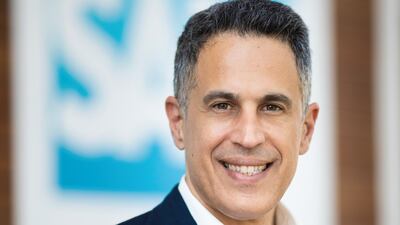By Manos Raptopoulos, President, SAP EMEA South
Shortly before this year’s Cop28 opened in the UAE, it was announced that 2023 is on track to become the hottest year on record. We are at the halfway point from 2015’s commitments to decarbonisation by 2030. There is still much to do: while the number of companies expressing net-zero targets has jumped considerably, only 4 per cent meet the stringent criteria laid out by the UN.
Not only do we need business leaders to recognise the urgency of reducing their emissions for planetary health, but we want them to recognise the massive business opportunities in sustainable business transformation and the low-carbon economy.
Among the cross-cutting themes for this year’s Cop is technology’s leading role in solutions that will help us stay on course with the Paris trajectory. I can attest that technology is a significant catalyst for decarbonisation across company operations and supply chains.
There is evidence that many businesses already recognize this link. A recent SAP survey found that 98 per cent of UAE companies surveyed report that environmental issues inform their strategic and operational decision-making. Moreover, almost 60 per cent began initiating environmental data collection within the past five years, while more than 70 per cent of UAE companies plan to increase their investment in sustainability strategies over the coming three years.
SAP’s message to the global business community on how technology will drive decarbonisation and create opportunities is three-fold.
Better data will lead to a better understanding
Sustainability data has become increasingly critical in decision-making. But the way carbon emissions, for example, are accounted for today is largely based on estimates and guesswork. Companies need actual data to better understand their supply chains’ impact and, in turn, help communities adapt to the powerful impacts of climate change.
The science shows we need to limit global warming to 1.5°C above pre-industrial levels. That requires ambitious policies that support private sector investment and technological innovation. SAP is bringing our tools, energy, and commitment to these two weeks in Dubai to help shape a lasting result in decarbonisation.
Companies must start treating carbon like money
Today, most companies still use averages and estimates to calculate their emissions. We need to quickly begin using actual, verifiable and auditable carbon emissions data. Carbon accounting has not yet matched financial accounting in terms of complexity, maturity and regulatory standards. After all, financial accounting has had more than 500 years to evolve, while carbon accounting is only 25 years in the making with the release of the Greenhouse Gas Protocol in 1998.
By calculating and sharing more precise emissions data across a company’s entire operation and supply chain, companies will over time be able to sync their emissions data with their financial data in a ‘green ledger’. This will allow them to more accurately report on their actual emissions, make decisions for lower-carbon products and processes, and build strong business cases for further climate-action investments.
Decarbonisation requires collaboration
Finally, companies and their suppliers must collaborate across their supply chains so they can share standardised carbon emissions data. Not only is it critical for the accurate accounting of Scope 3 emissions, often the largest share of a company’s overall footprint, but companies can better identify where opportunities exist for industry regulation to support bolder climate action policymaking.
Using just better data is not enough to achieve net-zero emissions. No company can take on the decarbonisation challenge alone. This collaboration includes using new energy sources and reducing material use and waste.
SAP is aligned with chief executives representing 12 million employees and US$4 trillion in revenues urging world leaders at Cop28 to lead by example. We’re asking governments to scale up investments in renewables while streamlining permitting and regulatory processes - and leading by example by ensuring government procurement practices become far more sustainable.
SAP is a signatory of the Global Renewables Alliance, which comprises more than 200 organisations calling for a Cop28 target that would triple renewable energy consumption to 11,000 gigawatts by 2030. We also support the New Delhi Declaration, which calls for tripling global renewable energy capacity by 2030 and achieving net zero by 2050. In addition, we’re committed to The Glasgow Financial Alliance for Net Zero (GFANZ), which seeks $100 trillion in private-sector investment to reach net-zero emissions by mid-century.
While we’re calling for global leaders to set far more ambitious climate targets, we also need governments to enable consistent and comparable climate-related disclosures at a global level and simplify carbon disclosure and reporting frameworks so that they encourage more transparency while eliminating inefficiencies.

